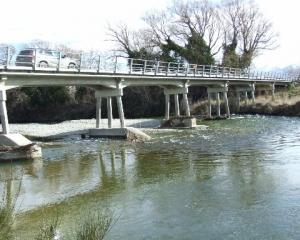After a decade of battling to protect their rights to water, lower Waitaki irrigation companies have formed a collective to pool financial resources and knowledge.
The new Waitaki Irrigators' Collective Ltd has just appointed a policy manager - Elizabeth Soal, of Dunedin - and plans to take a more proactive approach to issues that will affect them all.
The collective brings together the Lower Waitaki Irrigation Company, Morven-Glenavy-Ikawai Irrigation Company, Maerewhenua District Water Resources Company, North Otago Irrigation Company and Upper Waitaki Community Irrigation Company, representing interests on both sides of the river.
Together, they irrigate about 61,000ha in North Otago and Waimate.
The collective also has a provision for new members, particularly groups covering irrigators who have individual schemes along the lower river.
The new collective is funded by a levy based on the number of hectares irrigated by each company.
They companies have all faced major challenges over the past seven years, starting with the Meridian Energy Project Aqua proposal announced in April 2001 but cancelled in March 2004.
That scheme could have taken up to 340cumecs of water out of the river into a 60km-long power canal and used it to power six power stations between Kurow and the SH1 bridge, leaving little for future irrigation and having a major impact on existing schemes.
Since then, the irrigation companies have had to deal with a series of expensive and major issues, including the Government's decision to have a board prepare a water allocation plan for the Waitaki catchment, Meridian's north bank tunnel concept power scheme, the Meridian Energy-South Canterbury Irrigation Trust Hunter Downs irrigation scheme and processing 52 resource consent applications for the lower river below the Waitaki dam.
They have been involved in resource consent hearings at regional council and Environment Court levels at huge cost, both in terms of money and time.
On some issues, they adopted a collaborative approach by pooling resources and knowledge, but in others they overlapped on common issues.
The idea for the formation of an irrigators' collective came last year from Lower Waitaki Irrigation Company chairman Chris Dennison.
"Success to date in protecting the interests of existing irrigators has only been successful because existing irrigators have adopted a united, co-operative approach when dealing with the various parties involved.
"The creation of WIC (the collective) is designed to formalise this informal arrangement, to provide a more focused, professional structure," he said in a discussion paper.
The five companies have now established the collective as a company, under independent chairman Fraser McKenzie, an Oamaru accountant who has been involved in irrigation issues, including as chairman of Irrigation North Otago.
Mr McKenzie acknowledges the past decade took its toll on irrigation companies, both financially and in terms of the demands on directors, as they fought to protect their interests.
The farmers running the companies had spent a lot of time on company business, sometimes with an effect on their own businesses.
"These guys have been in the trenches for a long time and that has consumed a huge amount of their time.
"It's not a sustainable way to operate," he said.
There has also been a feeling of playing "catch-up" - being reactive to issues rather than proactive.
The collective aims to change that, adopting a proactive role over issues which will affect the irrigation companies in the future.
That will include identifying future issues at national, regional and local levels, becoming involved at the start to have an influence and impact on decisions which may be made.
It will also ensure the knowledge and expertise gained by individuals will not be lost.
The collective will tackle those issues representing all the irrigation companies, as they pool their resources.
That ranges from standardising things such as environmental farm management plans and irrigation efficiency across all the companies, so work is not duplicated, to dealing with high-level issuessuch as national freshwater management and the Canterbury Water Management Strategy.
The day-to-day management and operation of the schemes will be left to the individual companies, with Mr McKenzie envisioning the collective operating at a higher level.
It will also play a role in educating the community about the benefits of irrigation to the local and national economies, and the need for a reliable supply of water.
Waitaki Irrigators' Collective Ltd
• Set up to protect members' existing water rights and reliability by negotiating-bargaining with or lobbying interested parties who could influence or restrict existing rights
• To facilitate through research and best practice efficient, sustainable use of water
• Where efficiency and development result in surplus water, expand the area under irrigation
• Educate the wider community on the benefits of irrigation to the local and national economy, including reliable supply of water
• Support the interests of other irrigators and extractors whose interests do not conflict with the collective'sNorth Otago/WaimateWater companies pool resources


